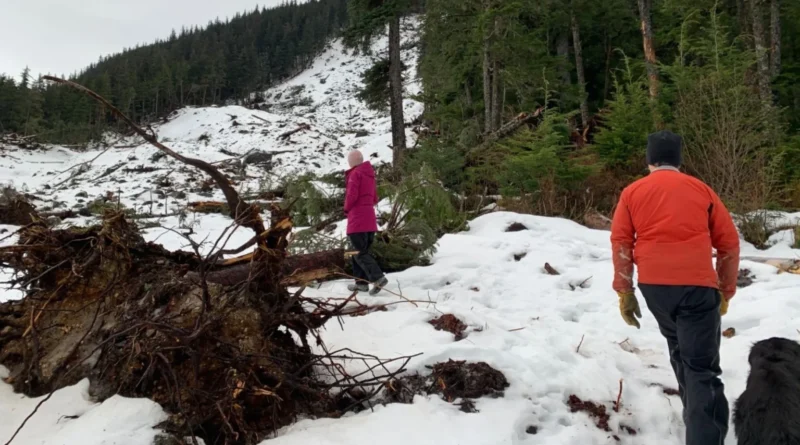Southeast landslide conference canceled amid federal uncertainty
Dozens of fire chiefs, city planners, tribal natural resource managers and other officials from across Southeast Alaska were set to gather last month for a second annual landslide conference.
But that didn’t happen.
The event’s organizers cancelled the gathering amid uncertainty over federal agencies’ ability to interact with regional landslide efforts moving forward. Another factor: President Donald Trump signed an executive order in February limiting travel by federal employees.
“Our state partners were pretty insistent that the federal representatives really needed to be there,” said Ron Heintz, a senior researcher with the Sitka Sound Science Center, which helped organize the conference.
“It would be very difficult to make plans and do things in the future without any sort of certainty of what the government landscape was going to look like in the next 12 months or so,” he added.
The two-day conference, which was scheduled to take place in Sitka starting March 11, was meant to pool landslide-related knowledge and strategies for managing the risk. Attendees should have included representatives from federal agencies like the National Weather Service and U.S. Geological Survey.
The gathering was born out of a broader, regionwide effort dubbed the Southeast Alaska Landslide Information and Preparedness Partnership. It’s made up of representatives from Southeast communities all seeking to better understand and prepare for landslide risk, which is increasing with climate change.
The region has seen four fatal landslides over the last decade, including one that killed two people in Haines in 2020.
Lisa Busch, who runs the partnership as a contractor for the Central Council of the Tlingit and Haida Indian Tribes of Alaska, said in-person gatherings like the conference are crucial.
“This is where the exchange of knowledge happens, so the communities can tell agencies and scientists what they’re concerned about, what they’re anxious about, what their needs are,” Busch said. “And the agencies and the scientists can talk to community members about what they know.”
Heintz echoed that point, noting that communities across the region are wrestling with a slew of similar challenges. Among them: modeling when and where landslides might happen, determining how to respond when they do occur, and making zoning and land-use decisions that could put fewer people at risk.
“These are all really difficult and complex questions, and that’s what we discuss in these, with this group of people that meet,” Heintz said. “And it’s really important that you do that face-to-face.”
Derek Poinsette has participated in the regional partnership as a member of the Haines borough planning commission. He said these types of events ensure landslide-related research and planning efforts aren’t siloed in different communities.
He added that Haines has seen benefits from the effort, including a state-funded landslide risk analysis published earlier this year. The borough had that opportunity due to connections made through the regionwide partnership.
“Not every community has one of those, so we’re kind of special in that regard,” Poinsette said.
Beyond the conference, Busch said federal agencies have played a key role in helping gauge landslide risk in Southeast, including by installing monitoring equipment. That work will likely be affected, she added, if federal employees can’t get back to the region.
“It’s kind of like you’re hooked up to an IV or a blood pressure machine, and a nurse can’t check on you,” Busch said. “What’s the point in gathering the information?”
In the meantime, she said, the risk isn’t going away.
“Landslides don’t care who runs the government,” Busch said. “We’re still going to have to deal with landslides here.”

